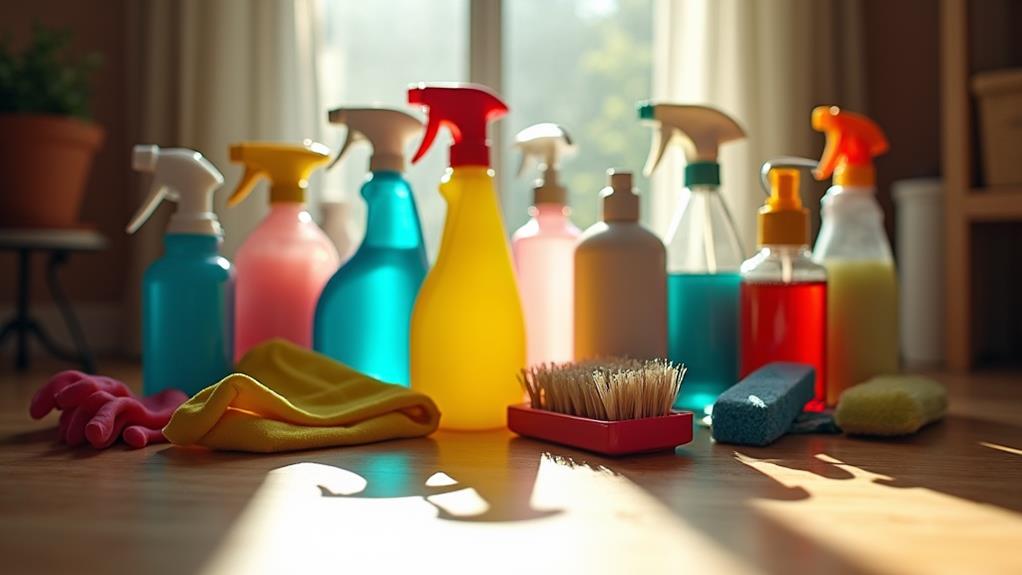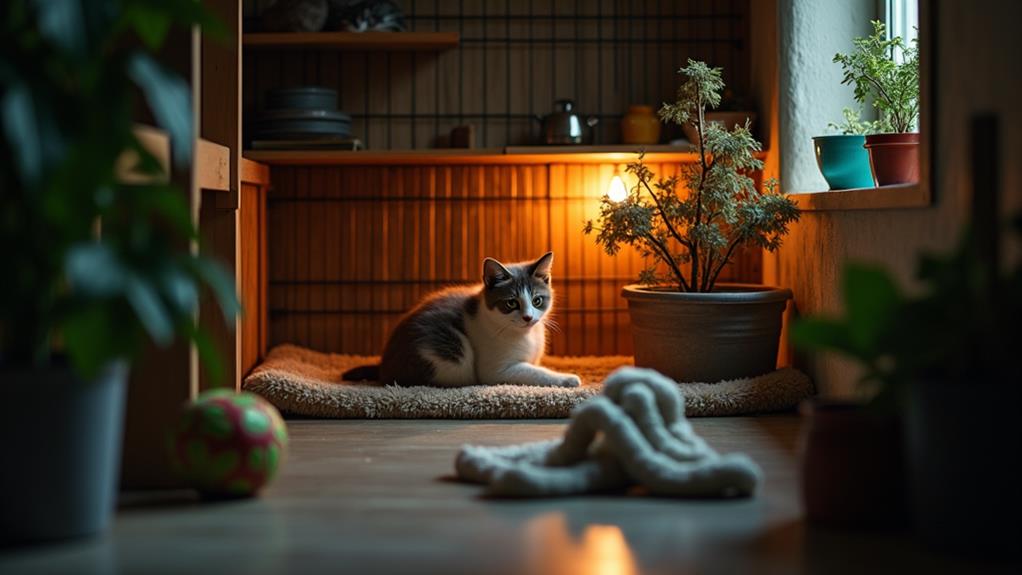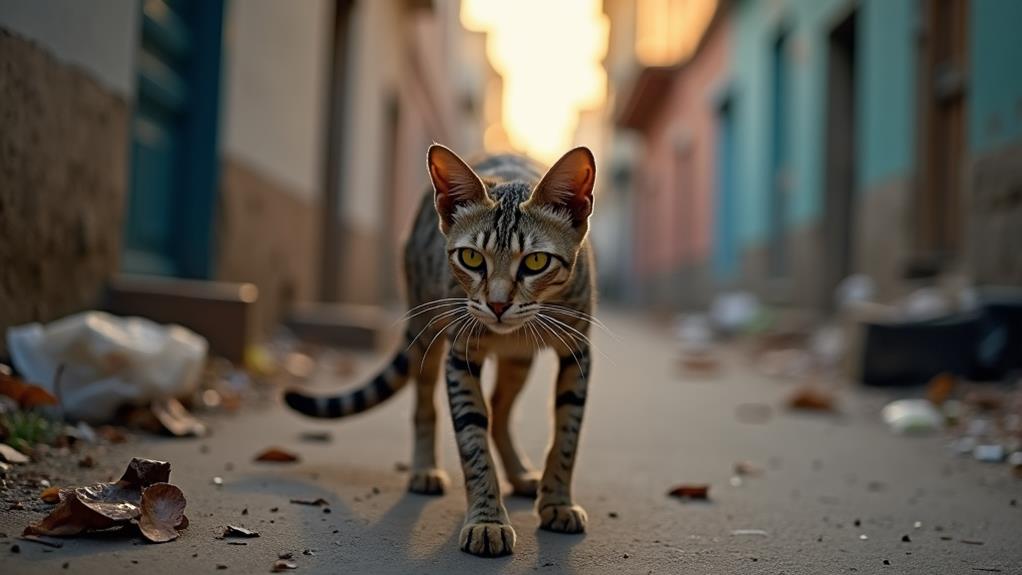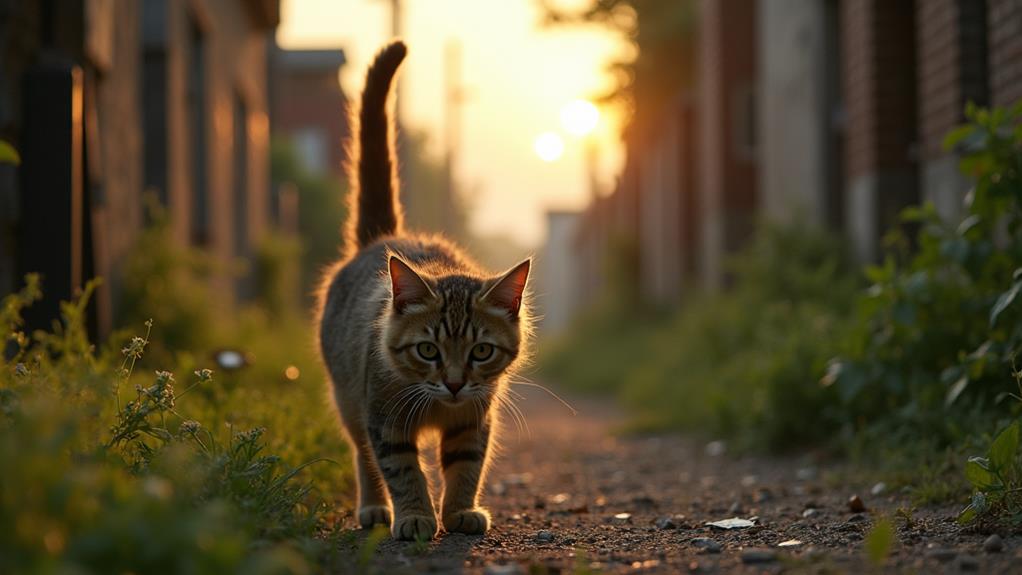How to Eliminate Feral Cat Urine Smell: Best Cleaning Tips
To eliminate feral cat urine smell, start by soaking up fresh urine with paper towels. Use a blacklight to spot all affected areas. A mixture of equal parts vinegar and water neutralizes bacteria. Follow up with enzyme cleaners like Nature's Miracle to break down the odor-causing uric acid. Let the area air dry completely afterward. For stubborn smells, try a DIY mix of hydrogen peroxide, baking soda, and dish soap. Consistent use of these techniques keeps your space fresh. Investing in tools like a blacklight helps guarantee no spot is missed. Learn more about effective cleaning and prevention strategies ahead.
Understanding Feral Cat Urine Odor
Feral cat urine often has a notoriously strong and persistent odor, largely due to its high ammonia content. This ammonia smell is not just unpleasant; it can linger and be challenging to eliminate, especially if you've got feral cats frequenting your area. The intense cat urine odor is further heightened by uric acid crystals found naturally in their urine. These crystals make traditional cleaning methods ineffective, as they don't break down easily and can remain even after the liquid has dried.
Male feral cats tend to spray as a territorial marking behavior, which can greatly exacerbate odor problems if you're dealing with a high cat population. These urine stains can weaken materials, and if left unattended, they might attract more cats to the area, perpetuating a cycle of marking and increased odor. Environmental factors like humidity and temperature can intensify the smell, making it even harder to remove the smell from your surroundings.
To tackle this pervasive issue, it's essential to understand the composition and behavior of feral cat urine. Knowing why the smell is so persistent is the initial step in effectively addressing and neutralizing the odor.
Immediate Steps to Take
To effectively tackle the feral cat urine smell, it is vital to act quickly. The initial immediate step is to soak up any fresh cat urine with paper towels to absorb as much liquid as possible. This step is imperative before applying any cleaning solution. Once you've absorbed the excess moisture, prepare a mixture of warm vinegar and water, combined in equal parts. Rinse the affected area with this solution to neutralize the odor-causing bacteria.
After rinsing, it is time to bring in the heavy artillery: an enzyme cleaner. Products like Nature's Miracle or Anti-Icky-Poo are specifically designed to break down the components of cat urine, effectively eliminating the smell. Apply the enzyme cleaner according to the product instructions, ensuring it penetrates the surface thoroughly.
Allow the treated area to air dry completely, as lingering moisture might attract cats back to the same spot for urination. If you're dealing with older stains, be prepared for multiple applications. A blacklight can be a handy tool to identify all affected areas requiring attention. These immediate steps will help you regain control and restore freshness to your space.
DIY Cleaning Solutions

When dealing with the stubborn odor of feral cat urine, crafting your own DIY cleaning solutions can be both effective and budget-friendly. Start by mixing white vinegar and water in a 1:1 ratio. This simple solution effectively neutralizes the bacteria causing the smell, making it a great initial step in your cleaning routine. After applying it, let the area air dry completely to guarantee the odor doesn't linger.
For more persistent smells, combine hydrogen peroxide with baking soda and a bit of dish soap. This powerful mixture not only oxidizes ammonia smells but also removes any remaining stains. Just be cautious with hydrogen peroxide, as it might lighten some fabrics or surfaces if left too long.
Once the area is clean, sprinkle a generous amount of baking soda over it. Allow the baking soda to sit for a few hours before vacuuming it up. This step absorbs any lingering odors, enhancing the deodorizing process considerably.
For deeper penetration, follow up with an enzymatic cleaner like Nature's Miracle. Its formula will break down urine components, assuring the smell is thoroughly eradicated. Consistent application of these solutions will help keep cat urine smells at bay.
Enzymatic Cleaners Explained
With the challenge of eliminating feral cat urine odor, enzymatic cleaners provide an effective solution that goes beyond masking smells. These enzyme cleaners contain specific enzymes designed to break down proteins and uric acid found in cat urine, effectively neutralizing odors. Instead of simply covering up the scent, they tackle the problem at its source, making them a superior choice for urine odor removal.
To guarantee the best results, apply the enzymatic cleaner generously to the stained area, allowing it to penetrate and work its magic. Letting it air dry is vital, as this gives the enzymes the time they need to break down odor-causing substances completely. Unlike traditional cleaners that may contain ammonia, which can inadvertently attract cats back to the same spot, enzyme cleaners don't have this drawback. This makes them a safer and more effective option for long-term urine odor removal.
Moreover, many enzymatic cleaners are non-toxic, making them safe for use around pets and children. Regular use can also help prevent future incidents by thoroughly eliminating any lingering odors that might encourage a cat to re-mark its territory. By choosing enzymatic cleaners, you're opting for an environmentally friendly and pet-safe solution.
Tools for Effective Cleaning

Tackling the stubborn odor of feral cat urine requires the right tools, and an array of effective cleaning methods can make all the difference. Start by investing in a good enzyme cleaner like Anti-Icky-Poo or Nature's Miracle. These cleaning products are specifically designed to break down the compounds in cat urine, effectively eliminating the smell instead of just masking it.
Once you've treated the area with an enzyme cleaner, use a blacklight to locate hidden urine spots. Under UV light, urine will glow, ensuring no area goes unnoticed. Next, mix a simple vinegar solution by combining equal parts of vinegar and water. This mixture is safe for most surfaces and helps neutralize bacteria that contribute to the smell.
After cleaning with vinegar, sprinkle baking soda over the area. Baking soda acts as a natural deodorizer, absorbing any remaining odors. For particularly stubborn stains and smells, create a paste with hydrogen peroxide, baking soda, and dish soap. Apply this mixture to tough spots, let it sit, and then clean it off. By using these targeted cleaning products and tools, you'll effectively combat feral cat urine odors, leaving your space fresh and clean.
Preventing Future Urination
Preventing future urination issues with feral cats requires a proactive approach. Start by maintaining a clean litter box environment. Scoop daily and change the litter regularly. This discourages cats from seeking alternative urination spots, which helps in preventing future urination problems. When the litter box is clean, you're less likely to deal with that lingering cat pee smell.
Provide multiple litter boxes in different areas of your home. A good rule of thumb is one box per cat, plus an extra. This setup accommodates territorial behaviors and guarantees each cat feels comfortable using its designated space. Remember, a clean litter box is essential, but location matters too. Place them in quiet, low-traffic areas, away from disturbances, to avoid stress-related accidents.
Consider using pheromone diffusers or sprays. These can create a calming atmosphere and reduce stress-induced urination. Stress can often lead to inappropriate urination, so a calm environment can be key in preventing future urination issues.
Lastly, schedule regular veterinary check-ups. These can help identify any underlying health issues that might lead to inappropriate urination. By addressing health concerns early, you can take one more step to eliminate cat urine problems effectively.
Professional Cleaning Options

Why struggle with stubborn feral cat urine odors when professional cleaning options can offer a dependable solution? When you're dealing with tough pet stain removal, hiring a service that specializes in this area can make all the difference. Look for cleaners that use hot water extraction methods. This technique is excellent for deep cleaning carpets, effectively removing embedded urine odors that regular cleaning might miss.
It's essential to choose a company that employs blacklight technology. This tech helps identify all the affected areas, as cat urine fluoresces under UV light, revealing stains you might not even know exist. A thorough cleaning begins with identifying every spot that needs attention.
A pre-scrub process improves the visibility of these stains, ensuring they're more effectively treated. By softening and loosening the dirt and residue, this step increases the complete cleaning effectiveness, making sure no odor is left behind.
Don't forget to compare costs and services. Many companies offer package deals, like cleaning two areas for around $110, which can be a budget-friendly option. By carefully selecting a professional cleaning service, you can effectively eliminate those pesky odors for good.
Testing Cleanliness With Blacklight
After employing professional cleaning services to tackle those stubborn odors, it's time to confirm every trace of cat urine is truly gone. To verify thorough odor removal, grab a blacklight and check for any missed stains. Cat urine fluoresces under ultraviolet light, appearing as bright orange neon spots on different surfaces. This can reveal hidden areas that might have been overlooked during initial cleaning.
Start by dimming the surrounding lights to improve the visibility of these spots. The darker the room, the easier it will be to spot the tell-tale glow of cat urine stains. This method works for both fresh and older stains, so it's a great tool for ongoing maintenance. Once you've identified the fluorescent areas, you can target them specifically for more effective cleaning and odor removal.
Regularly using a blacklight not only helps in maintaining cleanliness but also prevents lingering odors. These odors can attract cats back to the same location, potentially leading to repeated marking. By confirming all traces are removed, you reduce the chances of future problems. So, grab that blacklight, make your space spotless, and keep those unwanted odors at bay.
Managing Outdoor Cat Odor

Outdoor spaces can quickly become overwhelmed by the strong, persistent odor of feral cat urine, a scent that's tough to ignore due to its ammonia and uric acid content. To tackle this head-on, act promptly to remove the smell before it becomes a permanent part of your outdoor area. Start by mixing vinegar and water in a 1:1 ratio and apply it to the affected spots. This solution works well to neutralize the cat urine odor initially.
For a more thorough cleaning, use an enzyme cleaner like Nature's Miracle or Anti-Icky-Poo. These products break down the urine's components, effectively eliminating the smell from the area. Be certain to saturate the spot well and let the cleaner do its job.
After cleaning, sprinkle some baking soda over the area to further deodorize it. Baking soda is excellent at absorbing remaining odors. Once you've applied baking soda, allow the area to air dry in sunlight, as UV rays help kill any bacteria contributing to the smell. Following these steps guarantees you can enjoy your outdoor space without the lingering presence of cat urine odor.
Monitoring and Maintenance Strategies
Anyone dealing with feral cat urine knows that monitoring and maintenance are vital to keeping odors at bay. Start by regularly inspecting and cleaning areas prone to urine to prevent odor buildup. Immediate action can greatly reduce lingering smells, so don't wait too long before tackling new stains. Use a blacklight to identify hidden spots that aren't visible in regular light. This guarantees you clean all affected surfaces thoroughly, leaving no trace of odor behind.
Incorporate a routine cleaning schedule using enzyme cleaners for maximum odor control. These cleaners break down the urine components effectively, eliminating smells at their source. Complement enzyme cleaners with natural solutions like vinegar and baking soda to improve odor control. Stay vigilant by monitoring for signs of recurring feral cat activity, such as new stains or increased odors. If you notice these signs, take proactive steps to deter future incidents.
Implement preventive measures to minimize attracting feral cats to your area. Keep food secured and clean up scraps promptly. These simple actions can prevent cats from seeing your space as a convenient hangout, ultimately reducing the likelihood of future urine issues.




